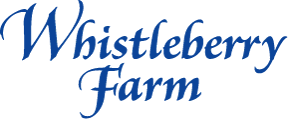Free Range Poultry & Eggs
Whistleberry Farm produces free-range eggs, as well as several kinds of poultry, each of which we discuss in other sections available on the menu above. Basically, we raise an assortment of old-fashioned traditional breeds of each species. All can be described as standard breeds recognized as such by the American Poultry Association, as opposed to the hybrids developed specially for the commercial industry. Most of the breeds I raise are now rare among domestic breeds, because they are not suited to the confinement rearing practices utilized by the companies that supply most of the poultry found in supermarkets. They can properly be called heirloom breeds. The term heritage breed may accurately be applied only to birds of American origin, and many of the birds I raise qualify for that distinction as well.
The greatest number of Chickens I raise are Dark Cornish, not to be confused with the large and rapidly growing Cornish Cross which was developed for production in confinement by the poultry industry. The other meat breeds I have raised here have included Barred Plymouth Rocks, Rhode Island Reds, Light Brahmas, Speckled Sussex, Wyandottes, Jersey Giants and Orpingtons among the varieties. I expect to focus on one or two breeds as time passes, and to begin raising most if not all of our stock on the farm.
In addition, we raise Pekin and Rouen ducks, as well as the Muscovy. I hope to start a breeding flock of Aylesbury ducks this year, in the hope that I can contribute to the survival of this often overlooked and underappreciated bird. We have a small flock of American Buff Geese, which produces an adequate number for our current customers.
I am raising Turkeys for outside purchase in 2008, focusing on the traditional heritage turkeys of American origin, not the commercial breeds now found in stores. We can sell you a turkey that tastes like you never thought it could. I will also be able to offer turkeys in sizes that range from being large enough for a traditional holiday dinner to a size suitable for the evening meal of an average family. Those breeds will include selections from the Standard Bronze, Bourbon Red, Beltsville White and Narragansett breeds.
We are always happy to raise the poultry of your preference as a custom order, if you are prepared to guarantee the purchase of two-thirds of the minimum number our hatchery requires us to purchase. In addition to specific breeds of ducks, geese and chickens, we have access to quail and pheasant.
Our birds, all of them, are started in separate small “batches” in a
brooder as hatchery chicks, with the exception of the breeds born here.
As soon as we can move them away from a heat lamp and outside, we do so.
That may be at a few days of age in the case of a gosling in warm weather
or a few weeks in the case of chicks in a cool spring. They go
first to a moveable shed, and get only short trips out on pasture until the
weather permits them to be outside all day. Then, they are
pastured all the time, although we maintain a shelter available to them.
The type and extent of shelter varies from one species of
poultry to another, and we keep trying new ideas. The degree of
confinement varies as well.
Sometimes we can get by with an electrified net that permits the birds to
go in and out at will during the day, but deters predators as long as the
birds return to a location inside the fence at night. They
generally do that.
Introducing the birds to range by increments permits us to get them
outside as fast as possible and onto what we all think of as range at the
earliest possible age. The notion of a bird scratching in the
soil and free to move about at will in a green pasture, is not the norm
in many “free-range” operations. It is in ours. Our
birds are not in buildings with “access” to a pasture. They are
in a pasture with access to a shelter.
One caveat is that in any given year, if I have hawk or owl problems that
are causing too many losses, I resort to confining the chickens to open-air
pens that I move around the pasture every day in an effort to approximate
free-range. The ducks and geese are given free-range when they
are old enough, but when predation picks up, I resort to “day-range” where
the birds are out during the day but shut in at night.
We start all our poultry on feed mixes designed specifically for hatchlings with the dietary needs of that species, but with no drugs or medication added. We include no antibiotics or other drugs in our feed. After the period of “baby food: appropriate to each species, all the poultry is moved to a custom-mixed feed without animal byproducts and without medication or stimulants. We do have the chicks vaccinated for potential disease at the hatchery. We choose this practice because it helps ensure the health of our flock. This vaccination of chicks is consistent with the standards required for poultry production that is certified organic.
